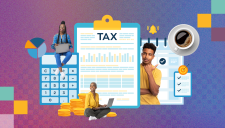Financial planners share what to do with extra money

Last updated on 20th May, 2022 at 05:11 pm
Having too much money at the end of the month is a problem most of us would be happy to have. Sometimes, though, there’s a windfall that comes our way – such as a tax refund, a performance bonus, 13th cheque or even an inheritance. When life gives you a lump sum, follow the advice of our financial planners and put your money to work for you.
Looking for personalised help with your finances? Speak to a financial planner (plus, as a Reality Core, Plus or Health member, earn up to 8 000 tier points!).
#1: Tackle debt first
Jiten Singh, director at Future Vision BlueStar, authorised by Sanlam recommends that investors ask themselves the following questions to assess the best place to put excess cash:
1. Do you have debt?
2. If you have debt, which debts carry the highest interest rate, and which debts can be consolidated into a single amount?
3. Do you have a retirement plan in place and are you saving the maximum allowed?
4. Which investments give the best rate of return?
5. Do you have sufficient emergency funds?
“Look at the amount you would save by paying off the highest interest debt, and the return that you could gain by investing the money, and weigh up the options. Sometimes you can earn slightly more by investing, as your interest rate on your home loan, for example, may be low, so rather earn better returns by investing the excess cash,” says Singh.
Singh says the best way to use excess cash is to pay off your most expensive debt first. If you don’t have debt in your name, look at investing the money or putting it into your retirement savings.
Overwhelmed with debt and not sure where to start? Our financial experts share five ways you can alleviate the stress and move towards being financially free.
#2: Start an emergency savings fund
Jyoti Gopee, senior financial planner at Pinnacle BlueStar, authorised by Sanlam, says it’s imperative to start an emergency savings fund if you don’t have one yet. “You need to be able to access money easily, with a short notice period and no penalties,” she says, listing a unit trust investment via Sanlam Collective Investments and Glacier as one savings vehicle option worth considering.
Investors can also consider a Satrix investment and can be set up with a recurring debit order from as little as R300 a month. Satrix offers exchange-tracking funds, such as the JSE Top 40, and mirrors the performance of the underlying index exactly. Finally, Gopee says if you have more appetite for risk, you can consider equities to set up a share portfolio.
Once you have an emergency fund in place, Gopee recommends that you consider the interest rate on outstanding debt and use any remaining lump sum to settle it. Personal loans can carry interest rates as high as 31%. “Always check the interest rate on debt vs the interest rate earned on an investment platform,” she says.
Looking for more savings secrets? Here are the five savings tricks financial planners swear by.
#3: Add to your retirement savings
Gopee emphasises the importance of starting an emergency fund, paying off debt, and then saving for retirement. If you don’t have debt, top up your retirement annuity (RA), especially if you haven’t yet used up your full annual allocation for tax-free savings, she says.
But it’s also important to look at the financial patterns and habits in your own life, she adds. “Sometimes I see clients keep creating debt. They keep on settling debt, then creating more debt, so they don’t meet their savings goals for retirement. If this is you, it’s a habit that needs to change,” she says.
Want to know how much you should put away monthly to reach your retirement savings goal? Use this retirement calculator to get started.
Top tip: Treating yourself is fine, but keep your eye on the financial ball
It’s tempting to take that money and splurge. You’ve been working so hard, for so long, and surely you deserve a good time?
“Life can throw us curveballs. Just look at what the world has been through in terms of COVID-19 and how it affected us financially,” Singh says. Without existing savings, an emergency fund, or low debt levels, many people experienced financial strain.
“Treating yourself is fine as long as you have all your priorities taken care of in terms of your financial wellness,” he says. “Life is a balance. You should be able to save for an emergency, maintain your RA and save for a holiday, all within your budget. It takes discipline, and often you need a financial planner. Instant gratification is not always possible,” says Gopee.
Need help managing your budget? Use this budget template to set the right foundation for a budget that works for you.
Want to use your extra money to build wealth and a better financial future? A qualified financial planner can assess your financial situation and help you make decisions to put you on the right track to your goals. Book a meeting with one today.
Want to learn more?
We send out regular emails packed with useful advice, ideas and tips on everything from saving and investing to budgeting and tax. If you're a Sanlam Reality member and not receiving these emails, update your contact details now.
Update Now







